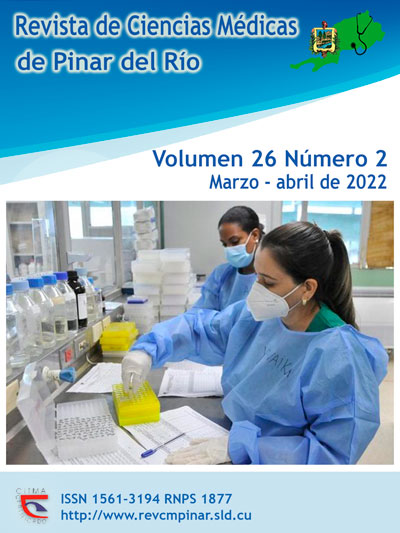La superación profesional y su contribución en el enfrentamiento a la COVID-19
Palabras clave:
CORONAVIRUS, COVID–19, SUPERACIÓN PROFESIONAL, EMERGENCIA SANITARIA.Resumen
Introducción: el SAR–CoV2 pertenece al género Coronavirus y se transmite por vía respiratoria. En Cuba se comienza la superación profesional como un componente clave del sistema de salud para poder asegurar la calidad y pertinencia de sus acciones; con una necesidad imperiosa de preparar a todo el personal médico en función de enfrentar esta emergencia sanitaria.
Objetivo: evaluar la repercusión de la superación profesional y su contribución en el enfrentamiento a la COVID-19.
Métodos: se realizó un estudio observacional, descriptivo y transversal en el mes de marzo a septiembre del 2020 en el Hospital Clínico Quirúrgico Docente “León Cuervo Rubio”, de Pinar del Río; donde el universo coincidió con la muestra de los 667 trabajadores que enfrentarían la COVID-19 en la provincia, donde fue necesaria la preparación del claustro de profesores, partiendo del diagnóstico de sus potencialidades y se desarrolló un curso de superación.
Resultados: la superación fue continua y escalonada, dirigida a personal profesional, en correspondencia con la actualización periódica del conocimiento y las necesidades de aprendizaje. Donde se apreció que no hubo fallecidos a pesar de presentar pacientes graves y solo el 0,15 % de los profesionales que trabajaron con estos pacientes se infestó.
Conclusiones: se comprobó que la mayoría de los profesionales después de la superación poseen un nivel suficiente de conocimientos sobre la COVID-19, logrado con el curso de superación, lo que permitió durante las dos primeras oleadas de la enfermedad un trabajo de excelencia.
Descargas
Citas
1. Peña Otero D. Manejo clínico del COVID-19: unidades de cuidados intensivos [Internet]. Ministerio de Sanidad del Gobierno de España; 2020 [citado 13/07/2021]; [14pp.]. Disponible en: https://www.researchgate.net/publication/340416345_
2. Amaró Garrido MA, Solenzal Álvarez YT, Hernández González T, Geovanis Alcides Orellana Meneses GA. Diagnóstico imagenológicos de neumonía por SARS-CoV-2 en pacientes con la Covid-19. Gac Méd Espirit [Internet]. 2020 diciembre 03 [citado 13/07/2021]; 22(3). Disponible en: http://scielo.sld.cu/scielo.php?script=sci_arttext&pid=S1608-89212020000300175&lang=es
3. Gonzales Zamora JA, Quiroz T, Vega AD. Tratamiento exitoso con Remdesivir y corticoides en un paciente con neumonía asociada a COVID-19: reporte de un caso. Medwave [Internet]. 2020 [citado 13/07/2021]; 20(7): e7998. Disponible en: https://www.medwave.cl/link.cgi/Medwave/Estudios/Casos/7998.act
4. Ministerio de Salud Pública. Protocolo de actuación nacional para la covid-19. Versión 1.3. [Internet]. La Habana; 2020 [citado 13/07/2021]: 1-227p. Disponible en: https://salud.msp.gob.cu/protocolo-de-manejo-clinico-de-covid-19-version-1-3/
5. Despaigne Pérez C, Martínez Rodríguez M, Díaz Bess Yorquidia O. Diseño de una modalidad de superación profesional para el diagnóstico precoz del cáncer de mama. Rev Inf Cient [Internet]. 2018 Abr [citado 13/07/2021]; 97(2): 343-351. Disponible en: https://www.medigraphic.com/pdfs/revinfcie/ric-2018/ric182n.pdf
6. Añorga J, Robau D, Magaz G, Caballero E, Toro M, Capote R. Glosario de Términos de Educación de Avanzada [Internet]. Scienceopen; 2010. [citado 13/07/2021]. Disponible en: https://www.scienceopen.com/document?vid=babac476-5154-4f6b-b110-c1d8c6569e39.
7. Ulloa Alfonso A. Superación profesional en la atención primaria de salud. [Tesis Doctoral]. Matanzas; 2016 [citado 13/07/2021]. Disponible en: http://cict.umcc.cu/repositorio/tesis/Tesis%20de%20Doctorado/Ciencias%20Pedag%C3%B3gicas/2016/
8. Salas Perea RS, Salas Mainegra A. Los modos de actuación profesional y su papel en la formación del médico. EDUMECENTRO [Internet]. 2014 [citado 13/07/2021]; 6(2): 6-30. Disponible en: http://scielo.sld.cu/scielo.php?script=sci_arttext&pid=S2077-28742014000200002
9. Weissmann K, Costa M, Huaiquilaf C, Correa C, Bey A, Bahamonde L. Covid-19 y cirugía ortopédica: Revisión de la literatura y evidencia. Rev. chil. ortop. traumatol [Internet]. 2021 [citado 13/07/2021]; 62(1): 57-65. Disponible en: https://pesquisa.bvsalud.org/portal/resource/pt/biblio-1342675
10. Ministerio de Educación Superior Resolución No. 140/2019 Reglamento de la educación de posgrado de la República de Cuba. La Habana: MES; 2019.
11. Cueto Mena A, Alonso Pérez S, Hernández Ledesma Y, Cordero Miranda Y, González Corrales SC. Estrategia de superación y formación en procesos quirúrgicos para licenciados en Enfermería. RevIberEducInvEnf [Internet]. 2016 [citado 13/07/2021]; 6(1): 25-36. Disponible en: http://www.enfermeria21.com/revistas/aladefe/articulo/189/.
12. Gallardo-Sánchez Y, Fonseca-Arias M, García-Rivera S, Mesa-Guevara L. El posgrado frente a la COVID-19 en Granma. Multimed [Internet]. 2020 [citado 13/07/2021]; 24(3). Disponible en: http://www.revmultimed.sld.cu/index.php/mtm/article/view/1979
13. Yordi García MJ, Ramos Monteagudo AM. Reflexiones sobre la COVID 19, desde la perspectiva social. Humanidades Médicas [Internet]. 2020 [citado 13/07/2021]; 20(2): 247-261. Disponible en: http://humanidadesmedicas.sld.cu/index.php/hm/article/view/1644
14. Mirabal Nápoles M, Cadenas Freixas JL. Las sociedades científicas de la salud frente a la COVID- 19. Humanidades Médicas [Internet]. 2020 [citado 13/07/2021]; 20(2): 463-469. Disponible en: http://humanidadesmedicas.sld.cu/index.php/hm/article/view/1677
15. Guanche Garcell H, Suárez Cabrera A, Márquez Furet A, González Valdés A, González Álvarez L. Componente crítico en las estrategias de atención médica, prevención y control de la COVID-19. Educación Médica Superior [Internet]. 2020 [citado 13/07/2021]; 34(2). Disponible en: http://www.ems.sld.cu/index.php/ems/article/view/2385
Descargas
Publicado
Cómo citar
Número
Sección
Licencia
Aquellos autores/as que tengan publicaciones con esta revista, aceptan los términos siguientes:- Los autores/as conservarán sus derechos de autor y garantizarán a la revista el derecho de primera publicación de su obra, el cuál estará simultáneamente sujeto a la Licencia de reconocimiento de Creative Commons que permite a terceros compartir la obra siempre que se indique su autor y su primera publicación esta revista.
- Los autores/as podrán adoptar otros acuerdos de licencia no exclusiva de distribución de la versión de la obra publicada (p. ej.: depositarla en un archivo telemático institucional o publicarla en un volumen monográfico) siempre que se indique la publicación inicial en esta revista.
- Se permite y recomienda a los autores/as difundir su obra a través de Internet (p. ej.: en archivos telemáticos institucionales o en su página web) antes y durante el proceso de envío, lo cual puede producir intercambios interesantes y aumentar las citas de la obra publicada. (Véase El efecto del acceso abierto).



